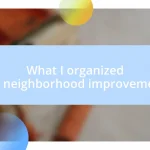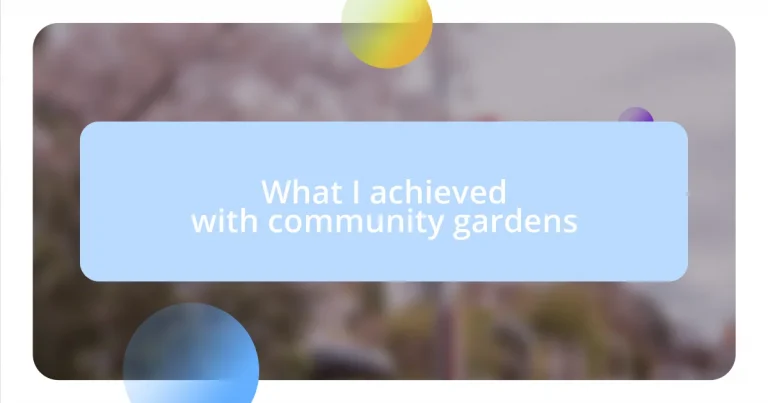Key takeaways:
- Community gardens foster connections among diverse individuals, leading to friendships, shared experiences, and cultural exchanges.
- Participating in community gardening promotes practical skills like problem-solving, patience, and collaboration, which extend beyond the garden into everyday life.
- Gardens enhance local food systems and promote environmental sustainability through practices such as composting and supporting biodiversity, while also inspiring others to engage in gardening.
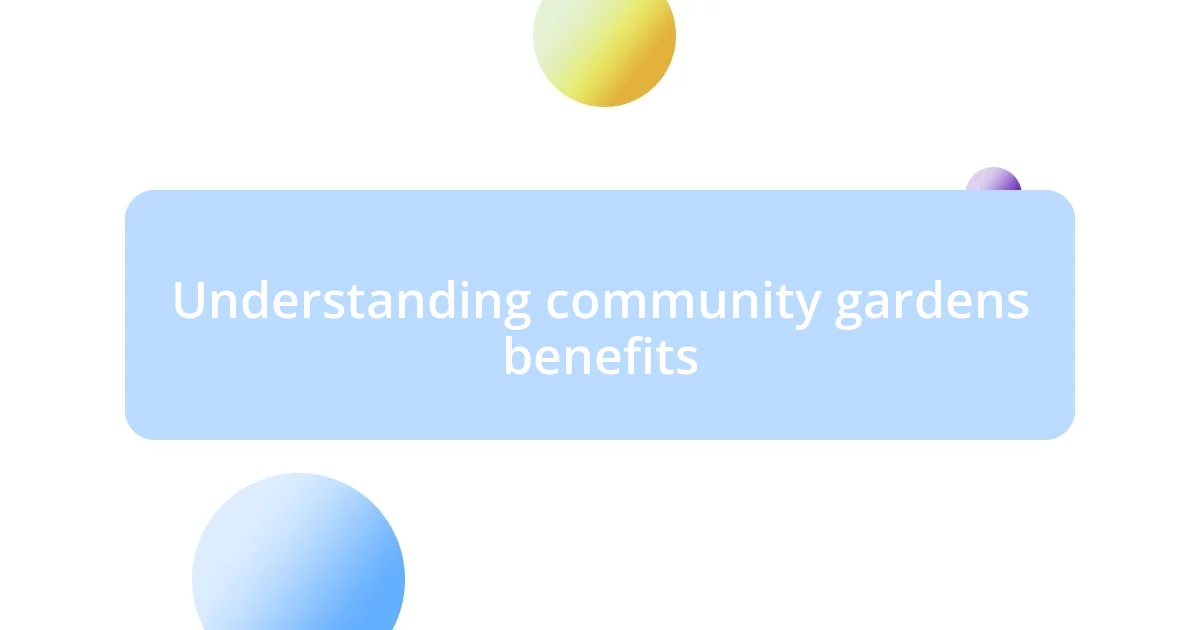
Understanding community gardens benefits
Community gardens offer a transformative space that brings together individuals from diverse backgrounds. I remember my first visit to a local garden where neighbors who had never spoken to one another suddenly shared stories over freshly picked vegetables. Isn’t it amazing how a simple tomato plant can cultivate friendships?
One significant benefit of community gardens is their ability to promote sustainability. As I dug my hands into the soil, I felt a connection to the earth that I hadn’t experienced before. Growing my own food not only reduced my carbon footprint but also deepened my appreciation for seasonal produce. Have you ever thought about how it feels to eat something you nurtured yourself? The pride that comes with harvesting your first crop is truly unparalleled.
Moreover, community gardens can be wonderful for mental health. I’ve found that spending time in nature, surrounded by greenery, instantly lifts my mood. It’s like finding a little oasis amid the chaos of life. Don’t you find that being in a garden encourages mindfulness? The act of planting and tending to the flora allows you to focus on the present, providing a soothing remedy for everyday stresses.
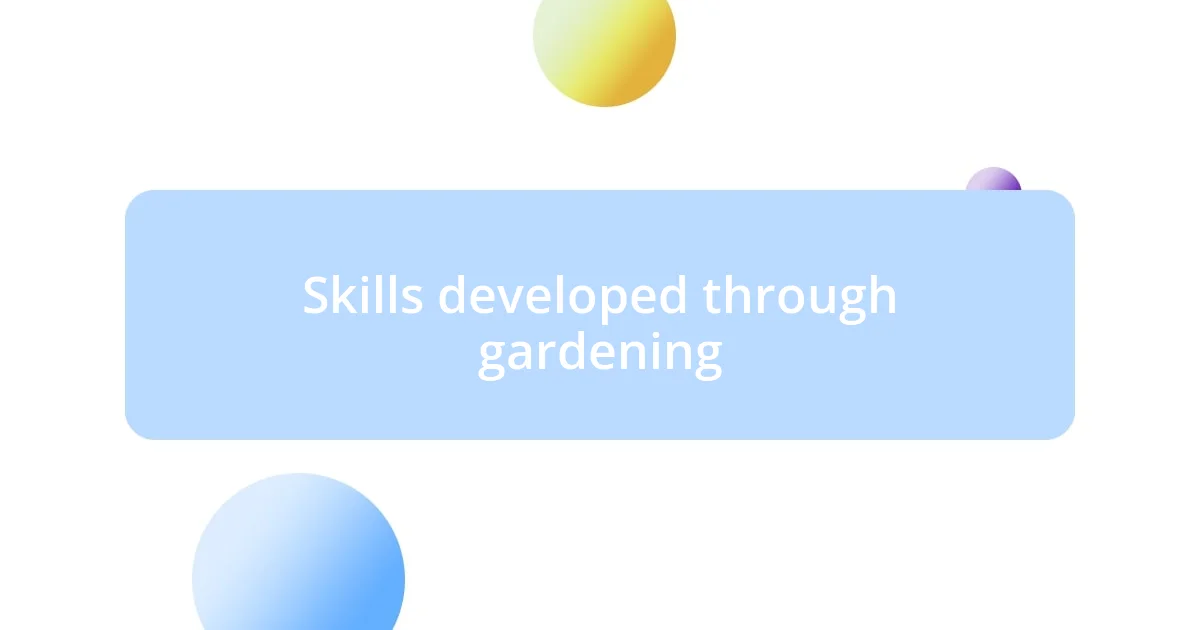
Skills developed through gardening
Gardening has led me to develop practical skills that extend far beyond simply nurturing plants. I remember the first time I learned to identify pests and diseases in my tiny plot; it was a moment of triumph, as I felt empowered rather than intimidated by challenges. Now, I approach problems with a more analytical mindset and take pride in my ability to troubleshoot. It’s incredible how figuring out a solution in the garden can translate to tackling issues in daily life.
Additionally, I’ve honed my patience and attention to detail through the gardening process. Waiting for seeds to sprout seems like an eternity, but it teaches a valuable lesson about nurturing growth at a natural pace. This was particularly evident when I tried my hand at growing herbs; I learned to watch carefully as tiny shoots emerged and thrive—or falter—with just a bit of care. Have you ever paused to appreciate the delicate balance of tending to something as it grows?
Collaboration is another skill that blossomed for me amidst garden beds. I distinctly remember a group planting day when our community worked together to revitalize an overgrown space. We shared tools, exchanged tips, and even laughed over mishaps ranging from misplaced seeds to overzealous watering. This experience deepened my understanding of teamwork; it’s a beautiful reminder that, just like in gardening, success often flourishes through cooperation.
| Skill | Description |
|---|---|
| Problem-Solving | Developing the ability to troubleshoot issues such as pest infestations and plant diseases. |
| Patience | Learning to wait for growth and understanding the importance of nurturing at a natural pace. |
| Collaboration | Enhancing teamwork skills through group gardening activities and shared experiences. |

Building community connections
Building community connections through gardening has been an eye-opening experience for me. I can still recall the vibrant chatter of neighbors during our weekly potluck in the garden. It wasn’t just about sharing food; it was about sharing lives, traditions, and laughter. I never realized how a shared plot could cultivate a sense of belonging that extended beyond the garden gates. It’s heartwarming to see people come together, forging connections that last far beyond the summer harvest.
Here are a few ways community gardens build connections:
- Shared Experiences: Working alongside others cultivates memories, whether it’s planting day or the thrill of the harvest.
- Cultural Exchange: Each gardener brings unique traditions, spices, and recipes that can enrich community ties.
- Support Networks: Neighbors become allies, helping each other with gardening tips or simply being there for a friendly chat.
The magic truly lies in the communal atmosphere, where friendship blooms as effortlessly as the flowers we nurture.
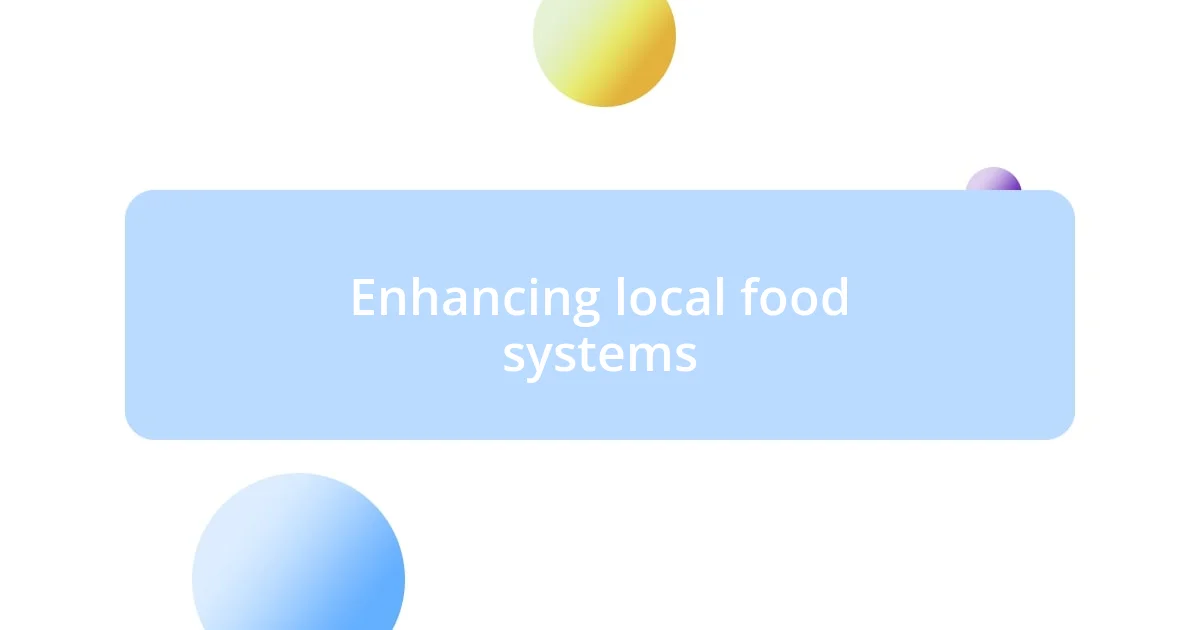
Enhancing local food systems
Growing food locally has a transformative effect on food systems within communities. I recall the first time I tasted a freshly harvested tomato from our community garden; the flavor was so vibrant and incredible compared to store-bought varieties. It made me realize how essential it is to have access to fresh, local produce. This experience fueled a passion for educating others about seasonal eating and the importance of prioritizing local sourcing in our diets.
The garden has also opened my eyes to the concept of food sovereignty. I remember organizing workshops that taught people to grow their own food, empowering them to take control of their nutrition. It was inspiring to see participants light up as they planted their first seeds, a simple act that fosters independence and resilience. Isn’t it amazing how a small garden can bridge the gap between food production and people’s well-being?
Moreover, the community garden served as a platform for discussions about sustainability and environmental responsibility. I often found myself engaging in conversations about composting and organic practices with fellow gardeners. These exchanges not only enriched our gardening experience but also illustrated how interconnected our food choices are with broader ecological issues. When we cultivate awareness about where our food comes from, we can genuinely enhance local food systems—ensuring that every bite we take contributes to a healthier community and planet.

Promoting environmental sustainability
When I first joined the community garden, I was struck by how much we could do for the environment simply by coming together. For instance, planting diverse species not only fills our plates with nutritious options but also supports local biodiversity. It’s fascinating to witness how these small acts can create habitats for beneficial insects, enriching the entire ecosystem around us. Have you ever thought about how your gardening choices impact local wildlife?
Composting has become another cornerstone of our green initiatives. I remember the excitement on everyone’s faces when we unveiled our first batch of rich, dark compost. It was like holding a treasure that could nurture our plants while diverting waste from landfills. This hands-on experience not only reduced our ecological footprint but also ignited a deeper understanding of waste as a resource. I can’t help but think — how can we transform other everyday habits to promote a healthier planet?
Engaging with sustainable practices has opened my eyes to the ripple effects we can create as a community. For example, during one of our seasonal workshops, we explored the concept of companion planting. The idea that certain plants can thrive together while repelling pests truly captured my imagination. It was rewarding to see everyone leave not just with knowledge, but with a renewed commitment to eco-friendly gardening. I’ve discovered that by sharing these insights, we can inspire each other to be better stewards of the environment, one garden at a time.
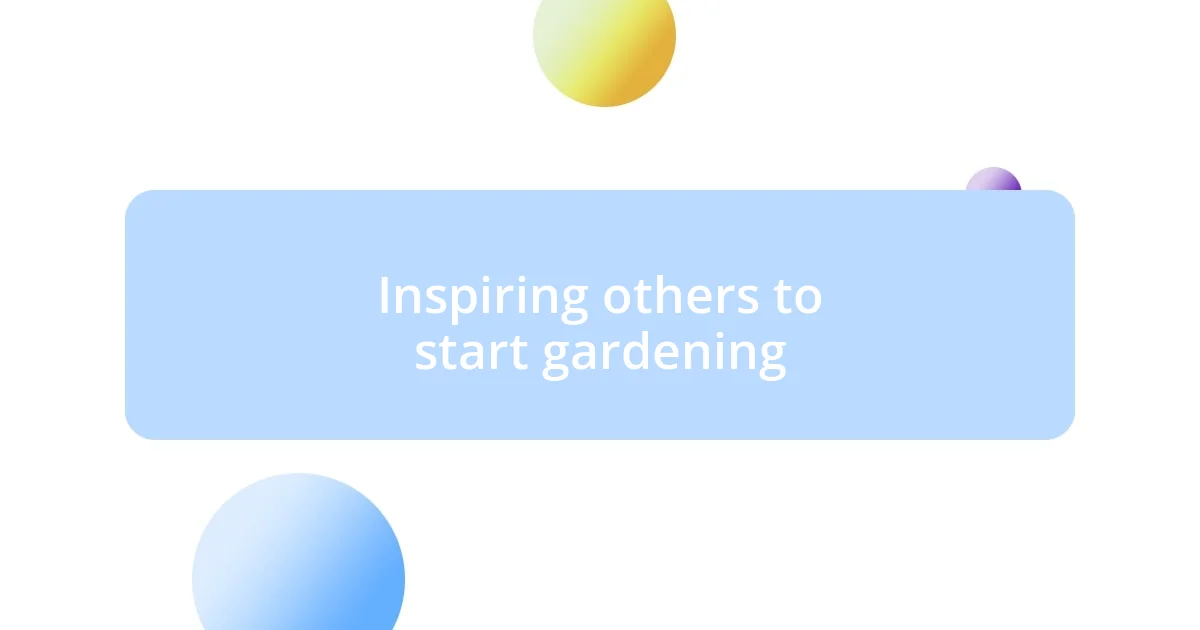
Inspiring others to start gardening
In my journey of community gardening, I’ve witnessed how sharing my passion can spark inspiration in others. I remember a moment when a hesitant neighbor joined one of our garden days. As she dug her hands into the soil for the first time, her eyes lit up with wonder and joy. Have you ever seen someone discover a hidden talent? It reminded me how gardening can unlock creativity and foster a sense of belonging among those who participate.
Whenever I share my stories about the joy of nurturing plants, I see curiosity blossom in others. Once, during a neighborhood block party, I set up a tiny seed-starting booth. Watching kids come over, eager to plant a seed and learn about its growth, reignited my own enthusiasm. It’s beautiful how such simple activities can plant the seeds of interest in the minds of future gardeners. What if everyone took a moment to nurture even one small plant?
Encouraging others to start gardening is like cultivating a garden itself; it requires patience and care. I distinctly remember the enthusiasm of a local school group that visited our garden. They were so engaged, asking questions and seeking advice on how they could start their own gardens. Their excitement reminded me of when I first dug into gardening, filled with hope and uncertainty. I felt compelled to guide them, knowing that each new gardener contributes to a collective movement toward green living. Isn’t it amazing to think of how one garden can inspire a multitude of others?



